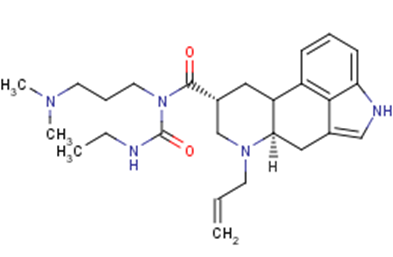
Cabergoline
CAS No. 81409-90-7
Cabergoline( FCE-21336 )
Catalog No. M22708 CAS No. 81409-90-7
Cabergoline is an ergot derived-dopamine D2-like receptor agonist. It has high affinity for D2, D3, and 5-HT2B receptors (Ki=0.7, 1.5, and 1.2, respectively).Cabergoline permits rapid and effective hormonal and tumor control by normalizing prolactin-producing pituitary adenomas levels.Cabergoline acts as a potent agonist of D2, D3 and 5-HT2B receptors.
Purity : >98% (HPLC)
 COA
COA
 Datasheet
Datasheet
 HNMR
HNMR
 HPLC
HPLC
 MSDS
MSDS
 Handing Instructions
Handing Instructions
| Size | Price / USD | Stock | Quantity |
| 5MG | 69 | In Stock |


|
| 10MG | 110 | In Stock |


|
| 25MG | 219 | In Stock |


|
| 50MG | 404 | In Stock |


|
| 100MG | 593 | In Stock |


|
| 200MG | Get Quote | In Stock |


|
| 500MG | Get Quote | In Stock |


|
| 1G | Get Quote | In Stock |


|
Biological Information
-
Product NameCabergoline
-
NoteResearch use only, not for human use.
-
Brief DescriptionCabergoline is an ergot derived-dopamine D2-like receptor agonist. It has high affinity for D2, D3, and 5-HT2B receptors (Ki=0.7, 1.5, and 1.2, respectively).Cabergoline permits rapid and effective hormonal and tumor control by normalizing prolactin-producing pituitary adenomas levels.Cabergoline acts as a potent agonist of D2, D3 and 5-HT2B receptors.
-
DescriptionCabergoline is an ergot derived-dopamine D2-like receptor agonist. It has high affinity for D2, D3, and 5-HT2B receptors (Ki=0.7, 1.5, and 1.2, respectively).Cabergoline permits rapid and effective hormonal and tumor control by normalizing prolactin-producing pituitary adenomas levels.Cabergoline acts as a potent agonist of D2, D3 and 5-HT2B receptors. Cabergoline(10 μM) is used to investigate its neuroprotective effects. MAP2 staining reveals that Cabergoline significantly suppresses the loss of neurons caused by H2O2 incubation. Pretreatment with Cabergoline inhibits H2O2-induced neuronal cell death in a dose-dependent manner. The detection of apoptotic nuclear condensation suggested that Cabergoline prevents apoptotic cell death following H2O2 exposure[1].Cabergoline has a longer elimination half-life (63 to 109 h) compared with other D2-like receptor agonists, both a long-lasting clinical effect following single-dose administration. And an improvement in the quality of life of patients with chronic diseases are expected[1]. The most significant reduction in rapid eye movement (REM) sleep bout number occurred during the light phase. In which Cabergoline-injected female handled mice has 67.3% less REM sleep bouts (F(1,11)=12.892, P=0.004) than Cabergoline-injected females that are restrained, although the greatest number in reduction of REM sleep bouts occurr during the dark phase (82.3% fewer REM sleep bouts; F(1,11)=3.667, P=0.082). In male mice, Cabergoline reduces baseline Prolactin (PRL) levels (98.5%; F(1,6)=13.192, P=0.011) from 5.8±1.3 to 0.08 ng/mL within 2 hours of injection. PRL levels return to values that are not different from baseline (5.0±0.60 ng/mL; F(1,6)=0.715, P=0.43), after a 7-day recovery period.
-
In Vitro——
-
In Vivo——
-
SynonymsFCE-21336
-
PathwayGPCR/G Protein
-
TargetDopamine Receptor
-
RecptorD2|D3|5-HT2B
-
Research Areaothers
-
IndicationInfertility
Chemical Information
-
CAS Number81409-90-7
-
Formula Weight451.6
-
Molecular FormulaC26H37N5O2
-
Purity>98% (HPLC)
-
SolubilityDMSO:32 mg/mL(70.86 mM)
-
SMILES[H][C@@]12Cc3c[nH]c4cccc(c34)[C@@]1([H])C[C@H](CN2CC=C)C(=O)N(CCCN(C)C)C(=O)NCC
-
Chemical Name——
Shipping & Storage Information
-
Storage(-20℃)
-
ShippingWith Ice Pack
-
Stability≥ 2 years
Reference
1. Odaka H, et al. Cabergoline, dopamine D2 receptor agonist, prevents neuronal cell death under oxidative stress via reducing excitotoxicity. PLoS One. 2014 Jun 10;9(6):e99271.
molnova catalog



related products
-
Pramipexole
A partial/full agonist of dopamine receptor with Ki of 3.9/2.2/0.5/5.1 nM for D2S/D2L/D3/D4, respeectively.
-
Quillaic Acid
Quillaic acid is the major aglycone of the saponins in the Chilean indigenous tree Quillaja saponaria Mol.
-
ABT-724
ABT-724 is an agonist of dopamine D4 receptor(EC50: 12.4 nM).



 Cart
Cart
 sales@molnova.com
sales@molnova.com


